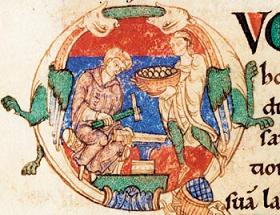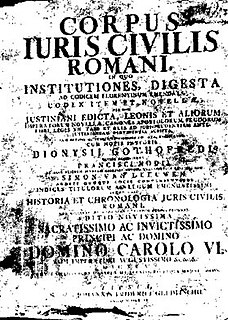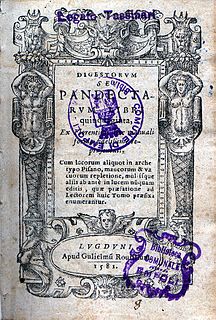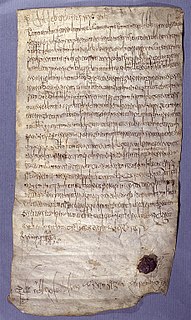 W
WThe Collectio canonum Quesnelliana is a vast collection of canonical and doctrinal documents prepared (probably) in Rome sometime between 494 and (probably) 610. It was first identified by Pierre Pithou and first edited by Pasquier Quesnel in 1675, whence it takes its modern name. The standard edition used today is that prepared by Girolamo and Pietro Ballerini in 1757.
 W
WSaint Gregory's Commentary on Job, or Moralia, sive Expositio in Job, sometimes called Moralia in Job or Magna Moralia, was written between 578 and 595, begun when Gregory was at the court of Tiberius II at Constantinople, but finished only after he had already been in Rome for several years. It is Gregory's major work, filling some 35 books or 6 volumes, a commentary on the Book of Job entitled "An Extensive Consideration of Moral Questions".
 W
WThe Consolation of Philosophy is a philosophical work by the Roman statesman Boethius, written around the year 524. It has been described as the single most important and influential work in the West on Medieval and early Renaissance Christianity, as well as the last great Western work of the Classical Period.
 W
WThe Corpus Juris Civilis is the modern name for a collection of fundamental works in jurisprudence, issued from 529 to 534 by order of Justinian I, Byzantine Emperor. It is also sometimes referred to metonymically after one of its parts, the Code of Justinian.
 W
WThe Digest, also known as the Pandects, is a name given to a compendium or digest of juristic writings on Roman law compiled by order of the Byzantine emperor Justinian I in the 6th century CE (530–533). It is divided into 50 books.
 W
WThe Frankish Table of Nations is a brief early medieval genealogical text in Latin giving the supposed relationship between thirteen nations descended from three brothers. The nations are the Ostrogoths, Visigoths, Vandals, Gepids, Saxons, Burgundians, Thuringians, Lombards, Bavarians, Romans, Bretons, Franks and Alamanni.
 W
WDe origine actibusque Getarum, commonly abbreviated Getica, written in Late Latin by Jordanes in or shortly after 551 AD, claims to be a summary of a voluminous account by Cassiodorus of the origin and history of the Gothic people, which is now lost. However, the extent to which Jordanes actually used the work of Cassiodorus is unknown. It is significant as the only remaining contemporaneous resource that gives the full story of the origin and history of the Goths. Another aspect of this work is its information about the early history and the customs of the Slavs.
 W
WThe parchment codex called Littera Florentina is the closest survivor to an official version of the Digest of Roman law promulgated by Justinian I in 530–533.
 W
WThe Martyrologium Hieronymianum or Martyrologium sancti Hieronymi is an ancient martyrology or list of Christian martyrs in calendar order, one of the most used and influential of the Middle Ages. It is the oldest surviving general or "universal" martyrology, and the precursor of all later Western martyrologies.
 W
WLiber Regulae Pastoralis or Regula Pastoralis is a treatise on the responsibilities of the clergy written by Pope Gregory I around the year 590, shortly after his papal inauguration. It became one of the most influential works on the topic ever written. The title was that used by Gregory when sending a copy to his friend Leander of Seville. The text was addressed to John, the bishop of Ravenna, as a response to a query from him. Gregory later revised the text somewhat.
 W
WThe Salic law, or the Salian law, was the ancient Salian Frankish civil law code compiled around AD 500 by the first Frankish King, Clovis. The written text is in Latin and contains some of the earliest known instances of Old Dutch. It remained the basis of Frankish law throughout the early Medieval period, and influenced future European legal systems. The best-known tenet of the old law is the principle of exclusion of women from inheritance of thrones, fiefs and other property. The Salic laws were arbitrated by a committee appointed and empowered by the King of the Franks. Dozens of manuscripts dating from the sixth to eighth centuries and three emendations as late as the ninth century have survived.